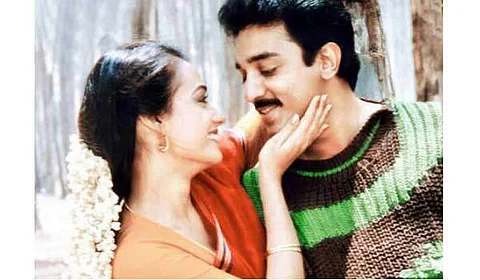

It’s a curious week for Tamil cinema. The biggest release of the week is a film that was originally released almost 30 years ago. The film, Vetri Vizha, has now been digitally remastered, and re-released today, much in keeping with the trend these days. And yet, Vetri Vizha, despite having been a blockbuster, isn’t particularly remembered in awe. My reaction to information of its re-release was mild intrigue, not the wide-eyed mania I reacted with when learning of, say, Baasha’s re-release.
I suspect that there would have been a lot more enthusiasm for the re-release of another Kamal Haasan film that released hardly about five months before Vetri Vizha: Aboorva Sagotharargal. That, like Baasha, has a lot more moments that have pop culture value. And of course, there’s the film's great USP: Kamal Haasan playing a dwarf. I’d be in the theatre in a jiffy if only to watch again that scene in which the mother of the dwarf, Appu, uses his physical handicap to make a case for another man. Show me the happiest man out there, and I’ll break him down into a dejected lump with this scene. A year from Vetri Vizha, there released another Kamal Haasan film that has since gone down as one of the actor’s most popular films: Michael Madana Kama Rajan. And scenes from that film have the opposite effect on you. They have the capacity to cheer the most disconsolate.
But I digress. We’ve got Vetri Vizha this week, and it’s not entirely devoid of its merits. For one, it’s among the very few times that we beat America to a film adaptation of its own literature: in this case, Robert Ludlum’s Bourne series. Of course, we may not necessarily have taken all the permissions, but when a story is tweaked enough, apparently a case can be made for it being original. Or so some say anyway. In keeping with the structure of Ludlum’s novel, Vetri Vizha too has a non-linear narrative and is about a man with memory loss, trying to put the pieces of his identity together. It’s this conceit that keeps you going for the longest time.
One of the enduring aspects of the film, shared by both Michael Madana… and Aboorva Sagotharargal, is its music by Ilaiyaraaja — the songs especially. Maarugo Maarugo was a rage, and even Kamal paid homage to it later in Sathi Leelavathi. The other songs may have since faded in memory, but revisit them, and you’ll catch yourself humming along. At least I did. There’s Seevi Sinukkeduthu, which serves to establish the second leads in the film, Prabhu (whose character seems forced into the narrative) and Kushboo.
While Vaanam Enna is a buddy song, Poongatru Un Per Solla is the flashback love song dedicated to the second heroine, Amala. Back then, and perhaps even now, all the main artistes usually are assigned a song each. There was also Thathom Thalangu, which, in keeping with those times, was something of an item number that also served the purpose of exposing the villain’s nefarious activities. Every single one of those songs are memorable, and if there are a few reasons to watch Vetri Vizha again, its music is right up there.
I also remember being rather fascinated by its villain, Zinda. For the Bollywood actor Salim Ghouse, it was an entry into Tamil cinema. And I particularly remember his character’s rather quirky, mirthless laughter throughout the film. It keeps you interested through the otherwise rather dull final act of the film.
Having dwelt on this film as much, I may just end up watching its re-release. If not just for its music, at least it will rekindle some of the memories associated with watching it when it first released in 1989. And if that’s not the point of re-releasing these old films, what is?
(The writer is the Entertainment Editor of The New Indian Express)